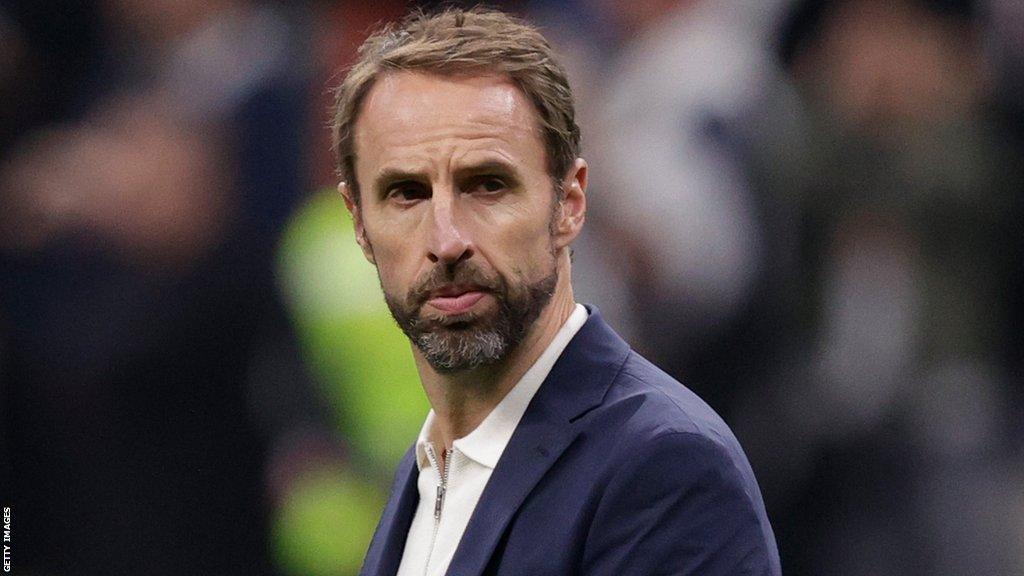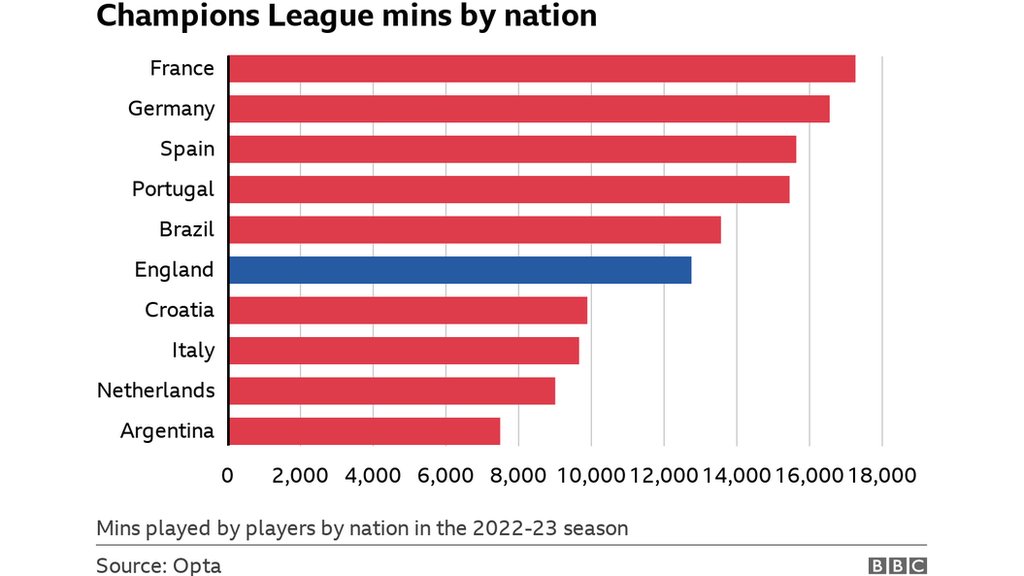Gareth Southgate: England boss worried about 'decreasing' number of English players
- Published
- comments

Southgate saw his England side beaten by France in the quarter-finals of the 2022 World Cup
Gareth Southgate says he may need to start selecting from "the Championship or elsewhere" in future because of what he claims is the decreasing number of English players in the Premier League.
About 32% of those starting in the top flight are eligible for England.
The England manager, who has been in the role since 2016, highlighted two recent weekends where that percentage fell to 28%.
"The numbers are the numbers. They're not going up," said Southgate.
"It has been around 32% but that's down from 35% when I took over and 38% in the years before so the graph is clear - there's no argument about that.
"Twenty-eight per cent has happened in a couple of weekends in the last few weeks."
Premier League clubs spent a record £815m in January, with the £2.8bn spent during the 2022-23 season doubling the previous record for a campaign.
Southgate highlighted that 80% of the players signed by English clubs during January were foreign and the low-key nature of the deals involving English players.
His comments come against the backdrop of him leading England to the semi-finals of the 2018 World Cup, final of Euro 2020 and quarter-finals of the 2022 World Cup.
While England also won the Under-20 and Under-17 World Cups in 2017, Southgate fears being "shorter than the other big nations on depth of selection" and that "those numbers are deteriorating rapidly in the Premier League".
The percentage of players eligible to play for England in the Premier League has dropped this season compared with the past two seasons but is broadly in line with the five-year average of 32%.
Also, the playing time of English players at the traditional big six clubs - Manchester City, Manchester United, Liverpool, Chelsea, Arsenal and Tottenham - has been around 27% for the past four seasons, which is 16% higher than the average for the previous four seasons.
This season, 161 English players have played in the Premier League, while 22 Englishmen have made an appearance in either France's Ligue 1, Italy's Serie A, Germany's Bundlesliga or Spain's La Liga. That latter figure was one during 2016-17.
Southgate added: "I think it won't hit us necessarily in the next 18 months but if there are 66 players each week, it does mean that positionally you have to add in what that means as well.
"I think we've got four left-footed left-backs in the Premier League at the moment so we will have to start looking in the Championship or elsewhere."
England players have catching up to do in Champions League

English players have played 12,718 minutes in this season's Champions League - French players have played the most minutes with 17,228 so far.
In this season's Champions League, England are sixth among countries in terms of the amount of minutes played by players eligible for the national team.
France, who won the 2018 World Cup and reached the 2022 final, are top of that table, with Germany, Spain, Portugal and Brazil behind them in that order. World Cup winners Argentina are 10th.
"It becomes more complicated [to succeed]," added Southgate. "What's the best way to judge our players? The Champions League.
"If you look at Champions League minutes this year we are sixth on that list - we're actually behind Brazil and Portugal.
"If breaking into the team is the foundation, the Champions League and the upper echelons of the Premier League is the finishing school.
"The rest of Europe get their foundation in their own domestic leagues and then the cream is sold around the big five leagues and they get the finishing school at the end.
"At the moment we are a long way behind France and Spain on those numbers and it is really interesting that Brazil, who obviously have a really powerful domestic league, now have as many players playing Champions League - or more than we have."

The rise and fall of the jeweller-turned-criminal: Listen to Gangster: The Story of John Palmer
Life-changing operations and difficult dilemmas: Watch Saving Lives in Leeds on BBC iPlayer now
